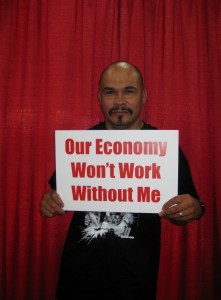The TPSeano Series: Construction Industry Stands to Lose if TPS Ends
By Carlos Guevara and Sabrina Terry, UnidosUS
In the third installment of the TPSeano Series, we look at how ending TPS protections for more than 325,000 people could impact the construction industry, as well as public safety. Our earlier posts in the series set the stage about what temporary protected status is and what is at stake.

Keep up with the latest from UnidosUS
Sign up for the weekly UnidosUS Action Network newsletter delivered every Thursday.
NEGATIVE CONSEQUENCES IN A TIME OF GREAT NEED
The TPS population has a very high labor force participation rate. A recent Center for Migration Studies report found that people with TPS from El Salvador, Honduras, and Haiti have a labor force participation rate that ranges from 81% to 88%, which is well above the rate for the total U.S. population (63%) and the overall foreign-born population (66%). An estimated 51,700 of TPS beneficiaries from these countries work in construction, which by a wide margin is the leading industry employing TPSeanos.
Ending TPS would have negative consequences for many communities. But the effect could be most dire in Texas and South Florida, which have been significantly impacted by Hurricanes Harvey and Irma. It’s estimated that these natural disasters have caused $200 billion worth of property damage, and the recovery process for these regions could take years.
In Texas, nearly 21% of Salvadoran and 24% of Honduran TPS holders work in construction, while in Florida it’s 23% and 29%, respectively. It’s not surprising that the Essential Worker Immigration Coalition, which includes a wide range of business and trade groups such as the U.S. Chamber of Commerce and National Association of Home Builders, recently penned a letter calling on Congress to find a legislative solution for the hundreds of thousands of TPS holders who find themselves in legal limbo.
Distribution of TPS Holders in Houston and Miami Metropolitan Areas
| Metropolitan Area | El Salvador | Honduras | Haiti |
| Houston-Woodlands-Sugarland | 16,991 | 6,060 | |
| Miami-Fort Lauderdale-West Palm | 7,467 | 16,287 |
Source: ILRC.org
Not surprisingly, the demand for construction labor in these states is high. But according to a recent report by the Washington Post, many construction firms are facing significant challenges finding workers to rebuild. While there are many reasons that may help explain the labor shortages, tightening immigration restrictions may also be making it harder than in the past to find construction workers and other laborers.

A CHILLING EFFECT
A disappearing labor force is enough cause for alarm, but this shifting landscape has also affected how Latinos interact with the police, and whether or not they report crimes.
Earlier this year, Houston Police Chief Art Acevedo released city data that showed a 13% decrease in violent crime reporting by Hispanics in Houston during the first three months of 2017 compared to the first three months of 2016.
This included a 43% drop in the number of Hispanics reporting rape and sexual assault and a 12% decline in reports of aggravated assault and robberies. It’s likely that the chilling effect from increased interior enforcement is also spilling into other areas beyond reporting of crimes, including workforce participation.
It would be economically reckless to end legal protections for work-authorized TPS holders, who are arguably the most vetted populations in the country by virtue of having to submit to criminal background checks at least every 18 months for the past 16 years.
SAVE TPS
Ending TPS negatively impacts families and communities, and goes against our fundamental values of fairness and justice. TPS recipients not only need an extension but they also need a pathway to a more permanent status in the United States.
We are committed to working toward fair and commonsense administrative and legislative solutions that recognize the important contributions of the more than 325,000 TPSeanos who are at risk of losing these important protections.
FIND OUT MORE
- What is Temporary Protected Status?
- Saving the TPSeanos In Our Communities
- DREAMers and TPSeanos Are as American as Baseball and Apple Pie
RESOURCES AND WAYS TO GET INVOLVED
- Access resources for advocacy and community engagement
- Visit the #SaveTPS Campaign website and videos


